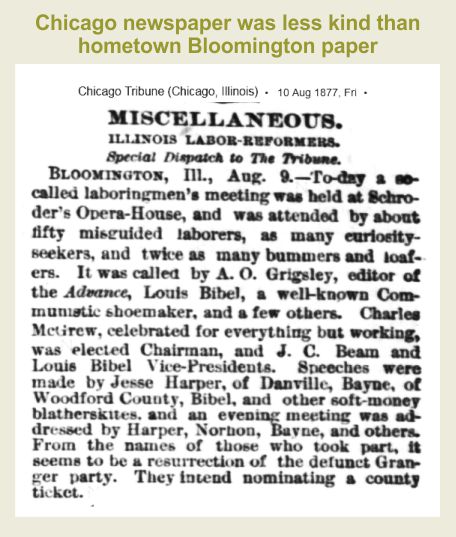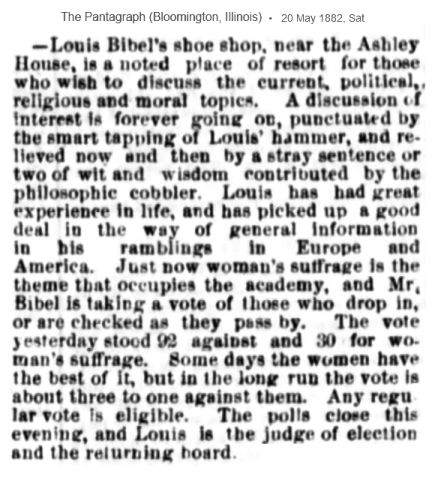|
"Mrs. Bibel is a hard-featured, dark-eyed
and dark-haired woman from the South...her
son Louis is as ill-favored, beetle-browed,
dangerous-looking young reprobate as ever
sought to stain his soul with a father's
blood or was a candidate for the State's
prison, where it is hoped he will speedily
land, accompanied by all who aided or
abetted in the most infernal, diabolical and
villainous affair that has ever been
recorded in McLean county."
The Pantograph, March 8, 1880
Louis Schwitalsky Bibel
Charles' father, Louis Bibel, was a man of many facets.
He was a German immigrant who deserted the
Confederate army to join the Union army (see
footnote below) and became a proud veteran
as well as a Marxist. His shoe-making
shop in Bloomington, Illinois became a place
for locals to debate politics and
philosophy. He was a husband whose
wife took a lover and conspired with his son
to murder him.
Until autumn 1879,
the Bibel family led an average middle-class
life in Bloomington, Illinois. Louis sr.
was a local tradesman, active in the
Temperance movement, and an officer in the Grand Army of the Republic.
His political views were so far left of center that
the newspapers branded him a communist but being called a
Marxist in the 1870s was like being called a
crackpot. Insulting but not an
accusation of treason. In a population of around
17,000, Bloomington had room for a few
colorful characters and Louis fit the bill
nicely.
William Osborne Davis (1837-1911) owned
and published The Pantograph
newspaper in Bloomington.
Though a long-time republican, Davis was
committed to preventing his newspaper from
becoming affiliated with a political party.
That independent spirit may have contributed
to the paper's tolerant approach to the Town
Communist, referred to in 1878 as "Louis
Sedowski Apocalypse Bibel" and in 1879
as "the well known German communist,
patriot, orator, shoe-maker, farmer and
politician." (The
characterization of Louis as a communist may
have been inaccurate; as a proponent of the Greenbacks
he probably supported organized labor and
opposed monopolies.)

In reading Pantograph references to Louis Bibel my sense was that he must
have been a likable guy, despite his political
proselytizing. So much so that when he
became the victim of a life-threatening
conspiracy, there was no ambiguity in The
Pantograph's condemnation of the "beetle-browed" perpetrators.
Signs of trouble. Newspaper takes note
In February 1879
Louis moved to the country to take up
farming but in October reversed the plan,
selling the 80-acre farm in Dry Grove
township (for $55/acre, a $107k transaction
today), purchasing 160 acres of farmland in
Padua township for $4,800 ($116k) and announcing
he'd soon be returning to shoemaking. The
Pantograph attributed the reversal to
the rocky Bibel marriage.
They had divided their property (commonly
referred to then as "making a partition")
and were separating. Louis took up
temporary lodging at one of several St.
Nicholas Hotels in Illinois then (the best-known being in Decator, the closest in
Urbana).
Louis decides to check out
In the early morning hours of Tuesday, October 7, 1879, Louis
drank four ounces of laudanum. A
boarder in the hotel, Samuel F. Dolloff,
a retired civil war cavalry officer and former
McLean county circuit court clerk, smelled
the substance on Louis' breath but Louis
refused an antidote. People at the
hotel took him to the
police department and forced him to drink an emetic
to induce vomiting. He survived but his
sons failed to persuade their parents to reconcile.
Louis spent some time in the Soldiers home in Dayton,
Ohio and they divorced a year later,
Margaret citing cruelty as the cause.
The Freiberger factor
In January 1880, an Adolph Freiberger (also spelled Freeberger,
Freyberger, Freeburger, Freyburger, etc.), a
farmer who would later become a machinist for the Chicago & Alton Railroad,
swore out a warrant against Louis,
citing threats made on his life
sometime prior. Judge Esquire Pancake
(for real, that was his name) bound Louis over for trial, held on $150
bail. Before long, the victim and
perpetrator roles traded places and the
courts were awash in Bibels with Louis
blaming Freiberger for the breakup of his marriage, accusing
Margaret of trying to poison him and of
carrying on an affair with Freiberger.
Sell the cows
When the Bibels
continued to dispute ownership of a few
items (two cows and a buggy) the
court ruled the items should be sold
at auction and the monies divided.
That auction was
in progress on Saturday, March 6, 1880, with
a good-sized crowd gathered in the
Bloomington town square (one report
estimated as many as 500 which seems crazy
high).
|

|
Spice, whips and a gun
As trial witnesses would later
attest, Margaret Bibel strode up to Louis,
opened a large package of cayenne pepper and threw it in his
face. She then brought forth a pair of
cowhide whips and began thrashing him. Nothing
is known of her size but Louis was short and
120 lbs. so she hadn't picked a fight
with a giant.
Partly blinded by
the pepper, Louis wrestled one of the whips
from his wife's hands and gave her two
licks. That's when their oldest son,
seventeen-year-old Louie
jr., appeared, about ten feet away, aimed a
revolver at his father, proclaimed, "I'm
going to shoot you," and did so.
Tried to, anyway. Louis sr. dodged the
first shot toward his head and grabbed his
son as Louie tried to fire again, this time
toward his father's heart. There was a
struggle and the gun fell to the ground.
Esrey Dodson, a house painter, grabbed it
but Louie got it back again. Charles-the-future-trombonist,
age twelve, arrived on the scene and began
pummeling his father. Police appeared
and arrested the lot, jailing Margaret and
Louie jr. The police released Louie
and granted custody of he and his brother
William to a guardian, William Whitehead. Freiberger was
arrested later for conspiracy to commit
murder.
In the March 9, 1880 trial before judge Richard M. O'Connell,
with an audience sympathetic to Louis, Margaret asserted Louis had spoken vile
language to her. Eyewitnesses said
otherwise. Townsman Joshua Sells had heard
Louis say, "There goes the last of the Bibel
estate," as they watched the cattle auction.
Three witnesses testified to having seen Margaret
remove the string from her package, throw
pepper at Louis and wield the cowhide whips,
and to seeing Louie shoot the revolver.
One, Ed Willis, also heard Freiberger say, "Shoot the son of a
bitch," when the first shot missed.
And the coup de grâce: gunsmith/locksmith Charles Gmehlin testified
that Louie came to his shop that Saturday
morning with Freiberger and purchased a
revolver and cartridges. Policeman
Richard Carroll testified that he took that
same revolver away from Louie. On route
to jail, Louie worried he'd accidentally shot his
mother when aiming at his father.
Also testifying against the accused was
state's attorney Joseph Fifer (whose
assistant prosecuted the case) and attorney
James S. Ewing, each of whom had watched the
scuffle from their office windows.
On March 11, 1880 judge O'Connell fixed bail for the trio,
with $1,500 set for Louis, $1,000 for Freiberger and $500 for Margaret.
A May 1880 grand jury brought true bills against Louie,
Margaret and Freiberger for assault to kill.
Police released Louie on bond in August after 135 days in
jail His father raised the money to
meet his bail and Louie was released into
his custody. Newspapers did not report whether Margaret or Freiberger
was bailed out but the following March Louis
circulated a petition requesting that states
attorney Robert B. Porter quash the cases
against Louie and Margaret. One of those
who signed the petition was state's attorney
Joseph Fifer who had testified against the Bibels
during the grand jury proceeding.
Porter fined each of the two Bibels $25 and six months
suspended jail sentence, but only after they pled guilty.‡
Nothing was reported about Adolph Freiberger's
prosecution. Margaret Bibel sued him
for $14.50 for an unknown loss (a package of
cayenne pepper?) and in 1887 he married
Frederica Schmidt.
Post shooting
In 1891 Charles and his
older brother William worked together as
photographers in Bloomington, sharing a workplace facility with their
father's shoe and boot making shop at the north end of Center
St. in Bloomington (at corner with Market
St., today home to a multilevel
parking garage), but continued living at the
south end with their mother and Louie (about where the Center street
railroad overpass is today). Ex-wife
Margaret described herself as widowed rather
than as divorced, a common choice of
divorcees at the time when divorce had a
taboo-like stigma. The woman had
confessed to attempted murder but, by golly, she was
not a wicked divorcee.
After Charles Jr. left Bloomington for Chicago, around
1897, brother William became a fireman and
lived with his father for a while.
Louis jr. continued living with Margaret
until her death, then with his father
until Louis went off to the Soldiers and
Sailors home in Quincy in 1900. (At
admission to the S&S home Louis filed a will
leaving his estate to Charles.)
Son Louie G. Bibel
remained in Bloomington. In the 1930s
he lived with William and his family.
~~~~~~~~
After reading about the Bibels I had an
image of 1880s Bloomington as something like Yoknapatawpha with Pantigraph
editor Davis as the town's Gavin Stevens.
This 1896 book changed that notion. Use arrows at bottom right
on that site to see the city's residential architecture in 1896.

|
